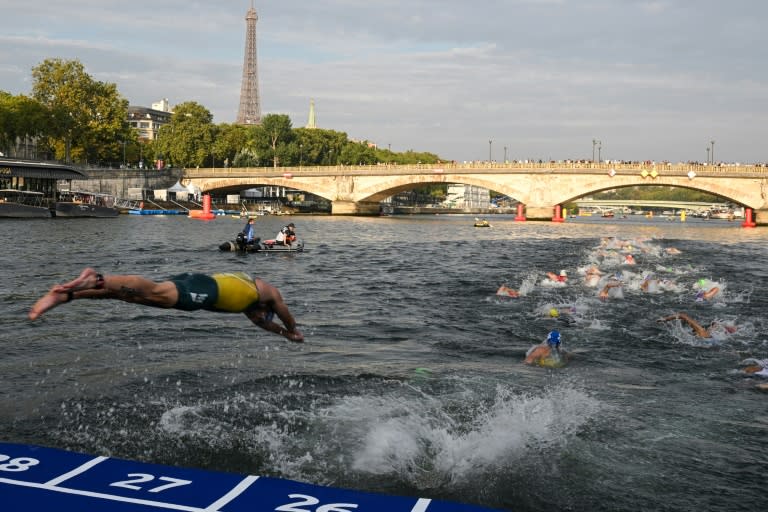River Seine unfit for swimming one month from Paris Olympics: tests

The river Seine is still failing water quality tests one month before the Paris Olympics when it is scheduled to host the open-water swimming competition and the swimming leg of the triathlon, results showed Friday.
The latest tests, completed last week and released by the Paris mayor's office, showed levels of the E.Coli bacteria -- an indicator of faecal matter -- are far above the upper limits imposed by sports federations.
On June 18, the level of E.Coli was 10 times acceptable levels and at no point did it fall below the upper limit of 1,000 colony-forming units per 100 millilitres (cfu/ml) used by the World Triathlon Federation.
The readings for enterococci bacteria were better, but they were still at unsafe levels for three of the seven days of last week.
"Water quality remains degraded because of unfavourable hydrological conditions, little sunshine, below-average seasonal temperatures and upstream pollution," the mayor's office said in a statement.
French authorities have spent 1.4 billion euros ($1.5 billion) in the last decade trying to clean up the river by improving the Paris sewerage system, as well as building new water treatment and storage facilities.
But major storms still overwhelm the capital's waste water network, some of which dates back to the 19th century, leading to discharges of untreated sewage directly into the river.
After months of unusually wet weather, the Seine is currently high up its banks, with its flow around four to five times higher than its usual level in the summer months, according to recent readings.
Organisers insist that some dry weather and sunshine in coming weeks should be sufficient to make the Seine fit for the outdoor swimming events.
"We are still confident with the delivery of the competitions in the river Seine," chief Paris 2024 organiser Tony Estanguet told reporters on Tuesday during a visit to the Olympic village in northern Paris.
"We knew from the beginning that the plan that we decided was really aligned with good conditions at the end of July," he said, speaking in English. "Now we are entering the final lap and the good zone."
- Delays -
The high water levels and rain are also disrupting preparations for the opening ceremony which is also set to take place on the river on July 26.
For the first time for a summer Olympics, the Games will begin outside of the main stadium, with athletes set to sail six kilometres (four miles) down the famed waterway on nearly 100 river boats.
But with currents unusually strong, organisers cancelled the first full practice session for the ceremony on Monday.
Paris mayor Anne Hidalgo, who wants to create public swimming spots in the river next year as part of the Olympics legacy, also had to postpone a planned dip to demonstrate its cleanliness last weekend.
She has promised to take to the water during the week of July 14 instead.
Constantly asked about contingency plans if the Seine remains too dirty and turbulent once the Games begin, Paris 2024 organisers publicly insist there are no alternatives to their plans.
Behind the scenes, sources have told AFP that the opening ceremony can be scaled back and could even become a much-shortened parade over a bridge in front of the Eiffel Tower.
For the open-water swimming, organisers have flexibility in the schedule, enabling them to delay the competition for several days in the event of a downpour that would lead to a spike in pollution.
In the worst-case scenario, it would be cancelled.
The triathlon can also be moved in the schedule and could become a duathlon -- just running and cycling -- without the swimming.
Local newspaper reports in Nice, southern France, suggested this week that the triathlon could be moved to the Riviera holiday spot, but this was denied by the organising commitee.
Athletes are busy training and trying to ignore the noise.
"Every time, there's been problems," French open-water swimming coach Stephane Lecat said last week, referring to last-minute suspense around Guanabara Bay for the 2016 Rio de Janeiro Olympics and concerns about the water quality in Tokyo in 2021.
"There are places around Europe that are a lot worse than the Seine and we swim there every year," he added.
pyv-dec-adp/db

 Yahoo Sport
Yahoo Sport 






































